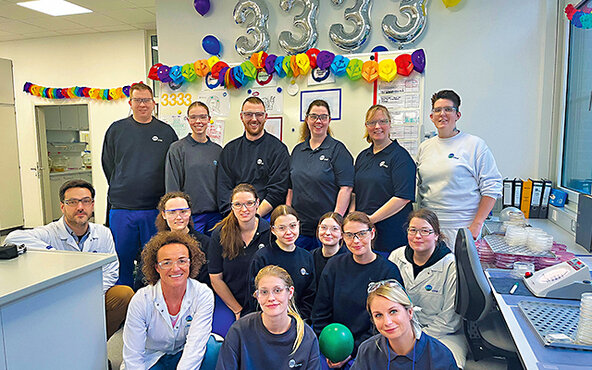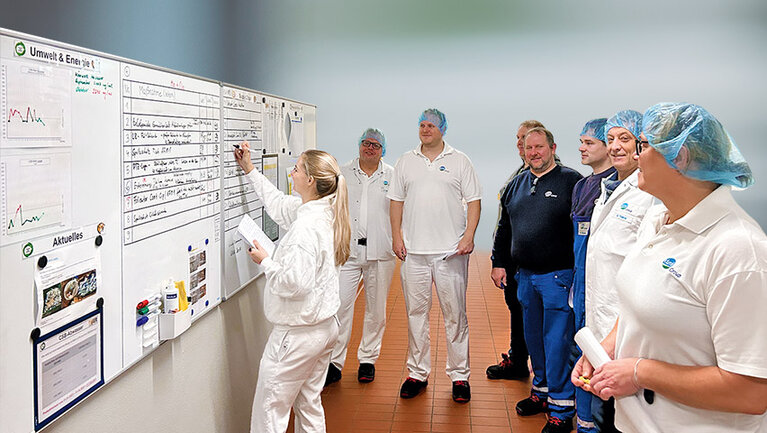
The TIGER program was rolled out at plants four years ago to optimize work processes, empower employees and encourage them to get involved in shaping the company more. Everyone can and should be involved in finding solutions to improve teamwork and the working environment, under the program. All may play a role in optimizing processes and improving workflows to make them more cost effective. The program is divided into six central topic areas, known as buckets: Safety at Work, Quality, Cost Management, Environment and Energy, Value Chain and Motivation.
… is a lean management method to improve efficiency and productivity in the workplace. It is based on the simple principle that each team meets regularly to discuss issues in their department, talk through any deviations from their targets and agree on countermeasures they can take. The team meets either on site in front of a whiteboard, or through a digital format. They gather around a shop floor board that shows the most important information, including targets, key figures, current problems, priorities and measures, in a format that is visible to all. Each person reports from their area of expertise and on their key figures. By pulling together everyone’s knowledge and information, the team can identify any problems and deviations more quickly and work out how to respond. “Good shop floor management improves collaboration, creates transparency and helps managers to lead and coach,” says Imke von Aschwege, team leader at the Edewecht plant. The laboratory team there has already started working with shop floor management. Colleagues take it in turns to direct the process, each taking responsibility for the shop floor board. When they spot deviations, they define measures and agree on a time to look for the causes and figure out possible solutions. They document any recurring disruptive factors, discuss them as a team and work to counteract them. Their positive results are made visible to everyone on a separate success board, under the heading, “What we have already achieved.”
“There are very good results in the optimization of work processes, in working together and in solving problems independently,” says von Aschwege. She points out that it is important for all colleagues to take responsibility for the measures.“This noticeably improves the speed of implementation and motivates the team.” “Actively involving employees adds value for each individual as well as for the company.” They aimed to think outside the box, discover new aspects and try out different things so visited DOC colleagues in the Netherlands in order to improve the exchange between the different plants. Continuous improvement makes many things visible, above all waste. The team works together to minimize this to improve performance. “It’s important for DMK to introduce this method across the board,” says von Aschwege. “From Group management right through to every team in each area.” Good cooperation and being open to new ways of thinking is the key to success, she says.

DMK Logistics in Zeven …
… was one of the first offices to start using TIGER, Continuous Improvement. They emphasized getting all the employees involved in learning what the program involves. It is a large department so 11 multipliers were trained up to help employees and managers introduce the measures and drive them forward. The team set up a digital shop floor board so it could be accessed from any location. For the team, one of the challenges was to establish suitable key figures as their work involves a significant amount of manual effort. When new problems arise, the team immediately considers what a key performance indicator could be, to identify the issue more quickly in future and introduce countermeasures. “Many projects from our area are currently being implemented,” says Ron Geerds, Head of Transport Logistics at DMK. “You can see the success in the significant reduction in overtime, for example.”
